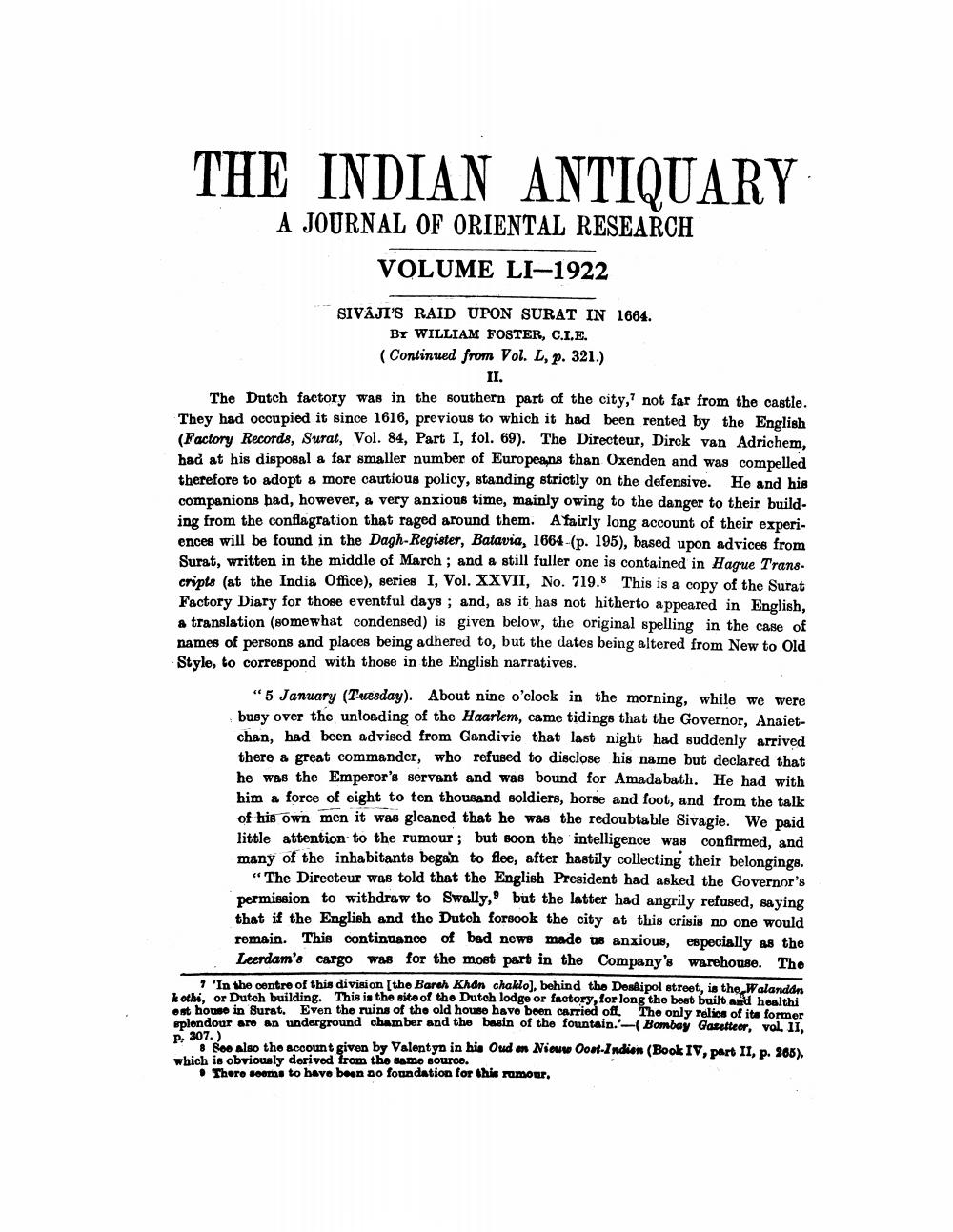Book Title: Indian Antiquary Vol 51 Author(s): Richard Carnac Temple, Devadatta Ramkrishna Bhandarkar Publisher: Swati Publications View full book textPage 5
________________ THE INDIAN ANTIQUARY A JOURNAL OF ORIENTAL RESEARCH VOLUME LI-1922 SIVAJI'S RAID UPON SURAT IN 1664. BY WILLIAM FOSTER, C.I.E. ( Continued from Vol. L, p. 321.) II. The Dutch factory was in the southern part of the city, not far from the castle. They had occupied it since 1616, previous to which it had been rented by the English (Factory Records, Surat, Vol. 84, Part I, fol. 69). The Directeur, Dirck van Adrichem, had at his disposal a far smaller number of Europeans than Oxenden and was compelled therefore to adopt a more cautious policy, standing strictly on the defensive. He and his companions had, however, a very anxious time, mainly owing to the danger to their building from the conflagration that raged around them. A fairly long account of their experiences will be found in the Dagh-Register, Batavia, 1664-(p. 195), based upon advices from Surat, written in the middle of March ; and a still fuller one is contained in Hague Transcripts at the India Office), series I, Vol. XXVII, No. 719.8 This is a copy of the Surat Factory Diary for those eventful days; and, as it has not hitherto appeared in English, a translation (somewhat condensed) is given below, the original spelling in the case of names of persons and places being adhered to, but the dates being altered from New to Old Stylo, to correspond with those in the English narratives. «5 January (Tuesday). About nine o'clock in the morning, while we were busy over the unloading of the Haarlem, came tidings that the Governor, Anaietchan, had been advised from Gandivie that last night had suddenly arrived there a great commander, who refused to disclose his name but declared that he was the Emperor's servant and was bound for Amadabath. He had with him a force of eight to ten thousand soldiers, horse and foot, and from the talk of his own men it was gleaned that he was the redoubtable Sivagie. We paid little attention to the rumour ; but soon the intelligence was confirmed, and many of the inhabitants began to flee, after hastily collecting their belongings. "The Directeur was told that the English President had asked the Governor's permission to withdraw to Swally, but the latter had angrily refused, saying that if the English and the Dutch forsook the city at this crisis no one would remain. This continuance of bad news made us anxious, especially as the Leerdam's cargo Was for the most part in the Company's Warehouse. The 'In the centre of this division (the Barah Khan challo), behind the Dondipol street, is the Walandan kothi, or Dutch building. This is the site of the Dutch lodge or factory, for long the best built and healthi ant house in Surat. Even the ruins of the old house bave been carried ofl. The only relies of its former uplondour aro an underground chamber and the basin of the fountain.'-(Bombay Gazetteer. vol. II. e loo the account given by Valentyn in his Oud en Nieuwe Oost-Indien (Book IV, Part II, p. 368). which is obviously derived from the same source. • There sooms to bave been so foundation for this rumour, P, 307.)Page Navigation
1 ... 3 4 5 6 7 8 9 10 11 12 13 14 15 16 17 18 19 20 21 22 23 24 25 26 27 28 29 30 31 32 33 34 35 36 37 38 39 40 41 42 43 44 45 46 47 48 49 50 51 52 ... 374
